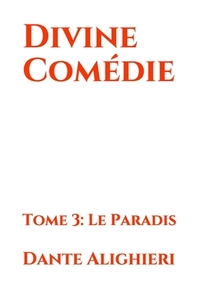You need to sign in or sign up before continuing.
Take a photo of a barcode or cover
challenging
dark
reflective
medium-paced
Plot or Character Driven:
A mix
Strong character development:
Complicated
Loveable characters:
Complicated
Diverse cast of characters:
Complicated
Flaws of characters a main focus:
Yes
Este magno poema concebido por Dante es no sólo el texto más importante de la literatura italiana sino uno de los más emblemáticos a nivel universal. Habiéndolo concluido me es fácil comprender porqué. Dividido en tres grandes partes: infierno, purgatorio y paraíso, cada uno integrado por 33 cantos más uno adicional que funciona como introducción, este poema es un despliegue de belleza y estilo, de compromiso con el equilibro y una inimitable proeza de espíritu creativo.
La divina comedia nos sumerge en los círculos más hondos y retorcidos del infierno y nos propone, junto a Dante, su protagonista, y los aliados que este halla en el viaje, un ascenso fascinante, retorcido y lírico hacia lo más alto del paraíso. Ayudado en primera instancia por Virgilio y en las secciones más divinas por Beatriz, Dante recorre los destinos que aguardan a las almas mortales una vez concluido su paso por la tierra y el lugar que les corresponde de acuerdo a las vidas adoptadas y los pecados cometidos. El infierno es, con diferencia, el punto más corrupto, oscuro y formidablemente creativo de la comedia.
Algo que me fascinó profundamente, además del estilo lírico y cuán amena me resultó la lectura, es la constante sucesión de grandes nombres que Dante despliega, desde importantes figuras políticas, pasando por grandes pensadores y enfrentándose a extraordinarios artistas, su viaje por los distintos estratos del infierno, purgatorio y paraíso no está plagado de espíritus anónimos sino que se topa una y otra vez con seres reales, famosos por su corrupción moral, su genio o su sacrificio. Este hecho enriquece en términos incalculables una lectura de por sí extraordinaria.
Me rehúso a profundizar más porque no quiero condicionar al lector con excesiva información, además, difícilmente mis palabras podrían genuinamente capturar la grandeza de lo conquistado por el autor.
La divina comedia nos sumerge en los círculos más hondos y retorcidos del infierno y nos propone, junto a Dante, su protagonista, y los aliados que este halla en el viaje, un ascenso fascinante, retorcido y lírico hacia lo más alto del paraíso. Ayudado en primera instancia por Virgilio y en las secciones más divinas por Beatriz, Dante recorre los destinos que aguardan a las almas mortales una vez concluido su paso por la tierra y el lugar que les corresponde de acuerdo a las vidas adoptadas y los pecados cometidos. El infierno es, con diferencia, el punto más corrupto, oscuro y formidablemente creativo de la comedia.
Algo que me fascinó profundamente, además del estilo lírico y cuán amena me resultó la lectura, es la constante sucesión de grandes nombres que Dante despliega, desde importantes figuras políticas, pasando por grandes pensadores y enfrentándose a extraordinarios artistas, su viaje por los distintos estratos del infierno, purgatorio y paraíso no está plagado de espíritus anónimos sino que se topa una y otra vez con seres reales, famosos por su corrupción moral, su genio o su sacrificio. Este hecho enriquece en términos incalculables una lectura de por sí extraordinaria.
Me rehúso a profundizar más porque no quiero condicionar al lector con excesiva información, además, difícilmente mis palabras podrían genuinamente capturar la grandeza de lo conquistado por el autor.
I've read better self-insert fics on tumblr dot com
5 out of 5!
This is a review of the Allen Mandelbaum translation.
"Through me the way into the suffering city, through me the way to the eternal pain, through me the way that runs among the lost. Justice urged on my high artificer; my maker was divine authority, the highest wisdom, and the primal love. Before me nothing but eternal things were made, and I endure eternally. Abandon every hope, who enter here"
Our journey with Dante begins in the year 1300 on a Good Friday with the famed poet Virgil by his side. The Divine comedy is split into three poems: Inferno, Purgatorio, and Paradiso. Where Dante and Virgil travel through hell, purgatory, and into heaven all in the name of reuniting with his love Beatrice who died tragically. Throughout his journey we meet many famous faces such as Achilles, Homer, Hector, Julius Caeser, Pope Nicholas III, etc. All who have either met their own redemptions or damnations according to Dante's own ideals.
An brilliantly beautiful and haunting story. Like Dante many times in Paridiso I was so in awe of what I was reading it's hard to describe into words how I feel. I wish Dante could have known what an masterpiece he created that even hundreds of years later it would touch of the minds and heartstrings of people who, even like me, aren't religious. Even with the grand and epic journey we take with Dante I couldn't help but enjoy the smaller aspects such his companionship with Virgil and his passionate, and beautifully described devout love for Beatrice. Here we have not just one of the most epic and grand poems of all time, but a in depth history of medieval Italian history and its politics and one of the greatest love stories ever written. My heart feels fuller from this divine comedy!
This is a review of the Allen Mandelbaum translation.
"Through me the way into the suffering city, through me the way to the eternal pain, through me the way that runs among the lost. Justice urged on my high artificer; my maker was divine authority, the highest wisdom, and the primal love. Before me nothing but eternal things were made, and I endure eternally. Abandon every hope, who enter here"
Our journey with Dante begins in the year 1300 on a Good Friday with the famed poet Virgil by his side. The Divine comedy is split into three poems: Inferno, Purgatorio, and Paradiso. Where Dante and Virgil travel through hell, purgatory, and into heaven all in the name of reuniting with his love Beatrice who died tragically. Throughout his journey we meet many famous faces such as Achilles, Homer, Hector, Julius Caeser, Pope Nicholas III, etc. All who have either met their own redemptions or damnations according to Dante's own ideals.
An brilliantly beautiful and haunting story. Like Dante many times in Paridiso I was so in awe of what I was reading it's hard to describe into words how I feel. I wish Dante could have known what an masterpiece he created that even hundreds of years later it would touch of the minds and heartstrings of people who, even like me, aren't religious. Even with the grand and epic journey we take with Dante I couldn't help but enjoy the smaller aspects such his companionship with Virgil and his passionate, and beautifully described devout love for Beatrice. Here we have not just one of the most epic and grand poems of all time, but a in depth history of medieval Italian history and its politics and one of the greatest love stories ever written. My heart feels fuller from this divine comedy!
challenging
informative
slow-paced
L’AMOR CHE MOVE IL SOLE E L’ALTRE STELLE <3 fanfic do séc. xiii that does the job!!
This is a book that needs to be read very slowly. One or two cantos a day, every day. With rumination on them for five minutes before moving on to a different activity. It's almost impossible to like it and read it in four days without serious backlash.
My backlash was that I hated every moment of Purgatorio (the point, please? Orthodox Christians don't have a purgatory), only laughed at parts in Paradiso (Alighieri sounded a bit obsessed with Beatrice), and cringed at bits of Inferno (terrible suffering was never my cup of tea).
Of course I'll be rereading. I must have missed something in the translation— the version I read was by Henry Wadsworth Longfellow, and unlike the original, didn't rhyme.
Ridiculously annoying, that.
My backlash was that I hated every moment of Purgatorio (the point, please? Orthodox Christians don't have a purgatory), only laughed at parts in Paradiso (Alighieri sounded a bit obsessed with Beatrice), and cringed at bits of Inferno (terrible suffering was never my cup of tea).
Of course I'll be rereading. I must have missed something in the translation— the version I read was by Henry Wadsworth Longfellow, and unlike the original, didn't rhyme.
Ridiculously annoying, that.
I can see why Inferno is the section people talk about the most, and the one that gets printed on its own regularly. The first section I loved, and would have rated 5 stars. It's the most convincing depiction of hell I've encountered (perhaps because most others are modelled on it) in that it was the closest I've come to understanding why people believe in it. The description was brilliant and lively. Even the characters Dante briefly encounters felt distinct, and because the focus as often on what they did to earn their place in hell, they served the dual purpose of at once explaining hell and helping one understand its relation to life.
Ironically, things started to go downhill as the story ascended. Purgatorio remained fairly interesting, with characters appearing to explain why they had fallen short of heaven. It still had fairly vivid descriptions, making it easy to imagine. Towards the end, as they near heaven, it starts to loose its bright descriptions and fewer interesting characters appear. The whole thing looses its lustre as we approach heaven.
Paradiso made me start to loose interest. First of all, heaven appears to be almost empty - it seems to contain saints, angels and Beatrice and the rest of humanity appear to have failed the entrance exam. There's very little focus on the good deeds done to earn a place in heaven, and instead we're presented with a series of lectures from Beatrice and the saints, which either appear to be attempting to explain some contested aspect of Christianity, or lecture on sins we've already encountered in the previous sections. It's notable that in the edition I have (which has wonderful illustrations), the images get much more boring in Paradiso - every illustration in that section is clouds and angels, where as previously there was great variety. The suggesting that hell would be a much more interesting place to be consigned for eternity seems to be upheld here. The highest circle of hell is filled with pre-christian artists, philosophers and poets all whiling away eternity together, where as heaven is filled with saints preparing lectures for the rare few who make it up that far. As a result, I find my self less inclined towards heaven than to some of the lower levels. I'm sure that says something not very nice about the state of my soul. I'm sure Beatrice would tell me I've placed to much value on earthly delights. Unfortunatly, I find myself rather put of heaven (and not all that convinced by the arguments the saints put forth).
Ironically, things started to go downhill as the story ascended. Purgatorio remained fairly interesting, with characters appearing to explain why they had fallen short of heaven. It still had fairly vivid descriptions, making it easy to imagine. Towards the end, as they near heaven, it starts to loose its bright descriptions and fewer interesting characters appear. The whole thing looses its lustre as we approach heaven.
Paradiso made me start to loose interest. First of all, heaven appears to be almost empty - it seems to contain saints, angels and Beatrice and the rest of humanity appear to have failed the entrance exam. There's very little focus on the good deeds done to earn a place in heaven, and instead we're presented with a series of lectures from Beatrice and the saints, which either appear to be attempting to explain some contested aspect of Christianity, or lecture on sins we've already encountered in the previous sections. It's notable that in the edition I have (which has wonderful illustrations), the images get much more boring in Paradiso - every illustration in that section is clouds and angels, where as previously there was great variety. The suggesting that hell would be a much more interesting place to be consigned for eternity seems to be upheld here. The highest circle of hell is filled with pre-christian artists, philosophers and poets all whiling away eternity together, where as heaven is filled with saints preparing lectures for the rare few who make it up that far. As a result, I find my self less inclined towards heaven than to some of the lower levels. I'm sure that says something not very nice about the state of my soul. I'm sure Beatrice would tell me I've placed to much value on earthly delights. Unfortunatly, I find myself rather put of heaven (and not all that convinced by the arguments the saints put forth).
only on hold for now, I don't have the manual capacity to read this right now, I will hopefully pick it back up later
This is a classic of Western Literature so I feel ignorant giving it only three stars (when I read classics, I feel pressured to like it a lot!). The story is great. I found Inferno the most gripping with Purgatory and Heaven less interesting. The main reason I give it three stars is more the translation; I suspect a newer translation would be easier. Along with that, the format of the kindle book was not helpful. Also I think I needed footnotes (which were absent from my edition) just to tell me background on all of the contextual things. I knew who Caesar and Aquinas and others were, but when Dante starts talking about people and geography of the Italy of his day, I got lost.
So all in all, this was one of the toughest books I have read. I liked it and am glad I stuck with it (I think I probably read it twice actually, having to reread most parts to get what was going on). It reminded me of Pilgrim's Progress with the whole journey motif. I can recognize why it is a classic and maybe if I find a better translation one day I will read it again.
So all in all, this was one of the toughest books I have read. I liked it and am glad I stuck with it (I think I probably read it twice actually, having to reread most parts to get what was going on). It reminded me of Pilgrim's Progress with the whole journey motif. I can recognize why it is a classic and maybe if I find a better translation one day I will read it again.






